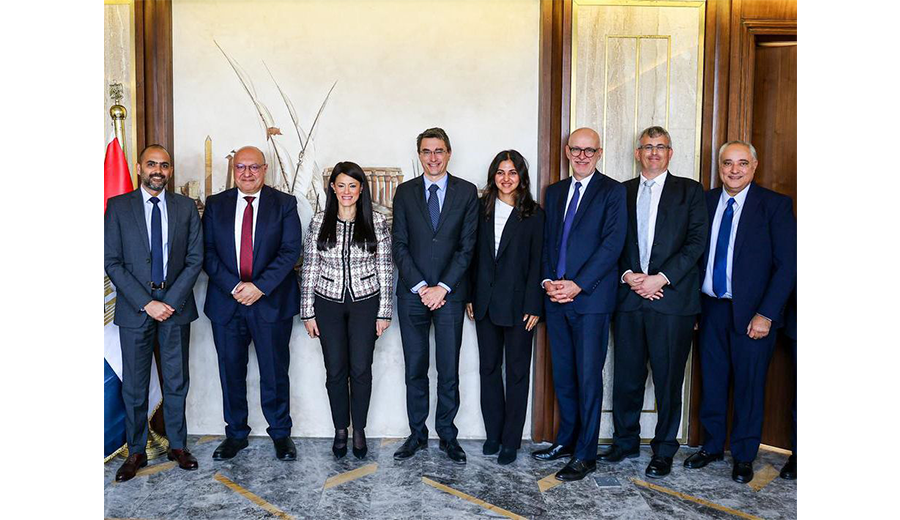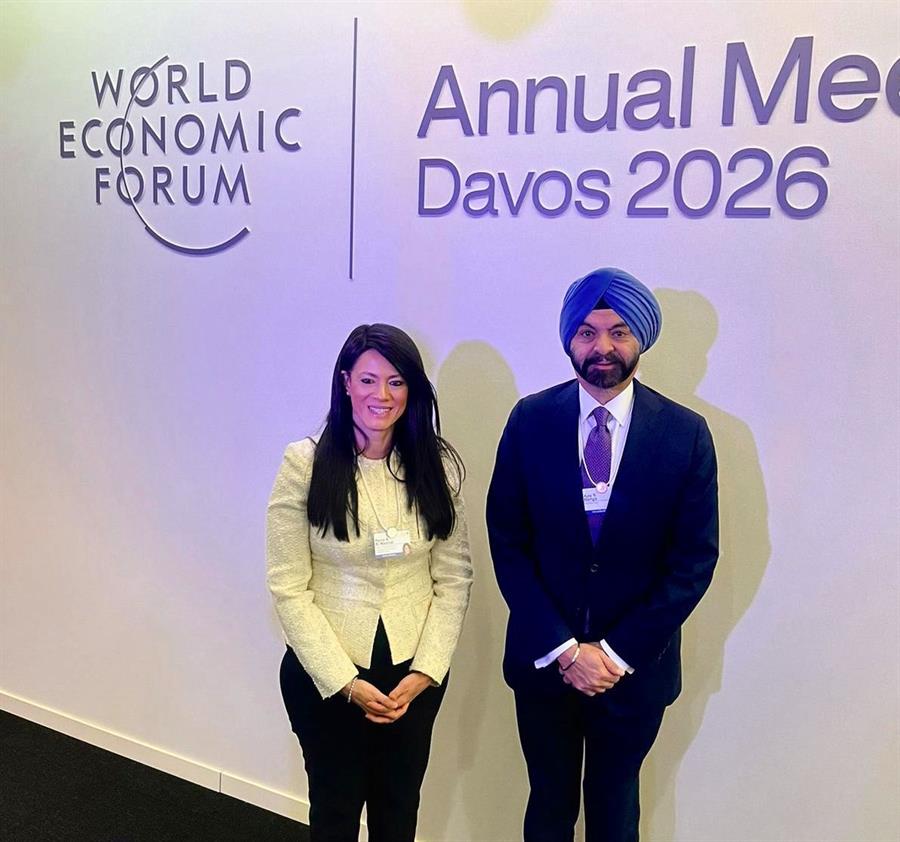Dr. Rania Al-Mashat Inaugurates World Bank's Regional Workshop to Prepare Report "Rethinking Food Security and Nutrition in the Middle East and North Africa"
18 June 2025
With the Participation of Representatives from 12 Countries…
Dr. Rania Al-Mashat Inaugurates World Bank's Regional Workshop to Prepare Report "Rethinking Food Security and Nutrition in the Middle East and North Africa"
Al-Mashat Emphasizes the Importance of Triangular Cooperation Between Egypt, the World Bank, and Member States to Advance Food Security Efforts
Hosting "Growth Academy" Events and Regional Workshop in Egypt Reflects the Close Partnership Between the World Bank and Egypt, and Joint Efforts to Confront Development Challenges
H.E. Dr. Rania A. Al-Mashat, Minister of Planning, Economic Development
and International Cooperation, inaugurated the regional workshop titled
"Food Security in the Middle East and North Africa," organized by the
World Bank. The event was attended by Mr. Stephane Guimbert, World Bank Country
Director for Egypt, Yemen, and Djibouti, Major General Walid Abul Magd, Deputy
Minister of Supply and Internal Trade, and representatives from 12 countries.
This comes in light of the close partnership between the Arab Republic of Egypt
and the World Bank to promote joint efforts for strengthening food security.
In her speech, H.E. Dr. Rania A. Al-Mashat, Minister of Planning,
Economic Development and International Cooperation, emphasized that the world
is witnessing rapid and unprecedented challenges at both regional and
international levels, which have made food security one of the top priorities
for countries and governments, considering it a fundamental pillar of social
and economic stability, and a pivotal element in achieving sustainable
development.
The Minister of Planning, Economic Development and International
Cooperation reiterated the necessity of building resilient national systems capable
of adapting and enduring crises, ensuring the provision of safe and sufficient
food for all. She noted that global crises, from the COVID-19 pandemic to the
repercussions of geopolitical conflicts and supply chain disruptions, have
exposed the fragility of global food systems.
H.E. Dr. Al-Mashat pointed out that the importance of food security is
increasing in the Middle East and Africa region, in light of climate
challenges, scarcity of natural resources, and changes in global trade
movement. This necessitates the integration of national and regional efforts,
and enhanced investment in sustainable agriculture, food production technology,
and value chain infrastructure, in addition to supportive policies to empower
small farmers and local producers.
H.E. Dr. Al-Mashat referred to successive international reports warning
of the challenges of food insecurity, especially with the increasing number of
areas suffering from malnutrition worldwide. The World Food Programme's 2025
report indicates that 343 million people in 74 countries worldwide suffer from
acute hunger, while the program needs approximately $17 billion in funding to
support 123 million people in 2025.
H.E. Minister Al-Mashat affirmed that food security has become an
international demand, and mobilizing international efforts from various
relevant parties has become an indispensable necessity, in order to enable
countries, particularly low-income and conflict-affected ones, to meet their
citizens' needs, by supporting policies and mechanisms that address the root
causes of food insecurity.
H.E. Dr. Al-Mashat also mentioned the report being prepared by the World
Bank on "Rethinking Food Security and Nutrition in the Middle East and
North Africa" to provide policymakers with data and recommendations. She
stressed its importance in providing a comprehensive regional perspective and
implementable recommendations for developing strong and resilient food systems,
in cooperation with the International Food Policy Research Institute (IFPRI).
H.E. Minister Al-Mashat underscored the importance of triangular
cooperation between Egypt, the World Bank, and member states to advance food
security efforts. She noted that the holding of "Growth Academy"
events and the regional workshop in Egypt reflects the close partnership
between Egypt and the World Bank and joint efforts to confront development
challenges.
H.E. Dr. Al-Mashat highlighted that the Arab Republic of Egypt has
placed achieving food security at the top of its national priorities,
recognizing its main relationship with national security and social stability.
She reaffirmed that the Ministry of Planning, Economic Development and
International Cooperation is working to advance these efforts within a
comprehensive development vision and a pivotal role in coordinating long-term
economic and social policies and overseeing public investments, ensuring the
integration of local resources and international partnerships to achieve
development goals.
In this context, the Minister confirmed that the Egyptian government has
been keen to increase government investments in the agriculture and land
reclamation sector as one of the basic pillars for achieving food security. In
the economic and social development plan for the current fiscal year,
investments in this sector increased by 20% compared to the previous year,
while in the next fiscal year's plan, public investments directed to
agriculture and irrigation activities are estimated at approximately 17.5
billion Egyptian pounds.
H.E. Dr. Al-Mashat added that the government continues to uplift rural
communities through the implementation of the National Project for the
Development of the Egyptian Countryside "Haya Karima," the first
phase of which has investments of approximately 350 billion Egyptian pounds. This
project reflects on improving the living standards of small farmers through
infrastructure development and increased investment in human capital.
H.E. Dr. Al-Mashat also pointed to the developments in the partnership
with international institutions, which have taken on a strategic dimension
through the food pillar in the Country Platform for the NWFE program. IFAD
plays the role of the main executive partner for this pillar, which embodies
Egypt's vision of linking food security with climate transformation, through a
package of projects aimed at enhancing the resilience of food production
systems.
On another note, H.E. Dr. Al-Mashat said that Egypt continues to
strengthen its long-term partnership with the Food and Agriculture Organization
of the United Nations (FAO), as well as the World Food Programme (WFP), to
support national food security plans, whether through technical support
programs, institutional capacity building, or joint projects in sustainable
agriculture and nutrition improvement.
H.E. Dr. Al-Mashat also highlighted the close partnership with the
European Union, which was elevated to the level of strategic partnership in
2024, with food security being one of its main axes of cooperation between the
two sides. The World Bank also has an extended development partnership with
Egypt in various sectors, and this cooperation has intensified following recent
global crises to support the Egyptian government's efforts in containing their
repercussions on food security in Egypt.
In May, H.E. Dr. Rania Al-Mashat, Minister of Planning, Economic
Development, and International Cooperation, witnessed the launch of the World
Bank Group’s “Growth Academy” for the Middle East and North Africa region. The
event was held in collaboration with the University of Chicago and the Economic
Research Forum in Egypt and took place over four days in Cairo. Representatives
from several regional countries participated, including Morocco, Iran, Turkey,
Tunisia, Algeria, Djibouti, and Nigeria.
This workshop is part of the World Bank’s strategic shift toward
becoming a knowledge bank—broadening the exchange of developmental solutions
and expertise, shaping global dialogues on development challenges, and
supporting countries, particularly developing ones, in continuing their
development paths amid complex global challenges.









